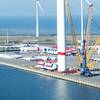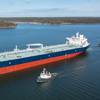In a move which has been hailed as a landmark moment for the bunker industry, the use of mass flow metering (MFM) for heavy fuel oil bunker deliveries in Singapore became mandatory on January 1, 2017.
The Maritime and Port Authority of Singapore’s (MPA) efforts have been applauded by many in the industry – including World Fuel Services – who see MFM as an important tool for developing more transparency and accountability for the bunker supply chain.
So how does MFM work, and why is it so important to the bunkering industry?
When a mass of liquid passes through an oscillating tube, the inertia effect of the moving liquid will cause the tube to twist – and the twisting will be in direct proportion to the liquid‘s mass flow. MFMs are composed of one or more tubes, and they use sensors to calculate the degree of vibration, and therefore the mass flow directly. This means there is no requirement to change the conventionally measured volumes of fuel to mass as MFM measures the mass directly.
MFM has shown its worth in the bunker industry over the past few years – and it has been employed for many decades in other sectors of the oil industry, especially on land and in refinery operations. MFM is extremely accurate. Indeed, TR48 requires that MFMs operate to an accuracy of +/- 0.5 percent.
According to World Fuel Services, using MFM should be a “win, win” for both the bunker supplier and the buyer. Firstly, MFM’s greater accuracy ensures that ship owners get exactly the amount of fuel that they paid for and the supplier is not giving away any extra fuel. Secondly, MFM is much faster and more efficient than using soundings, so it saves time and money for both parties.
There are other operational benefits too. MFMs can provide a real-time digital display of critical parameters such as flow rate and pressure, which means that any potential problems or abnormalities can be addressed, and corrected, immediately on site. Additionally, the actual quantity delivered at any given time is displayed in real time.
Bunker disputes over fuel quantity and quality can be time-consuming, costly and highly damaging to the relationship between buyer and seller. While it will never be possible to eradicate disputes entirely, the procedures that the MPA has put in place will help to remove some of the key causative factors.
With the migration to MFM, the role of a key partner in the bunker supply chain – the bunker trader – will be as important as ever.
World Fuel Services said it has been monitoring Singapore’s MFM plans closely, and it has been putting this knowledge and expertise to work for its clients – giving continuous updates on how to navigate the new market conditions with the least possible stress.
Shipping companies who bunker regularly in Singapore may already have some experience of the new technology. However, there will be some ship owners who will encounter MFMs for the first time in 2017. They may be sceptical about the benefits of the new technology and unsure of the procedures. However, World Fuel Services will be at hand to offer practical advice and help.
The mandatory use of MFMs for fuel oil deliveries in Singapore is part of an ongoing process.
In Singapore, the MPA and other stakeholders will be closely monitoring MFM’s progress, checking to see how it is helping to overcome bunker quantity issues. The MPA will also work on the continuing “digitalization” of the bunkering process, as the live data captured by the MFMs can be used to generate more reports and analysis. And now that all fuel oil barges are employing MFMs, there will be a focus on equipping gas oil barges too.
Singapore is the first port in the world to make MFM mandatory for heavy fuel oil bunker barges. The question is: will it be the first of many? Although no other port authorities have currently indicated that they plan to follow the mandatory route, MFM is steadily gaining traction in markets across the bunkering world. With over 25 marine offices globally, World Fuel Services are set up to support their customers wherever and whenever MFM is implemented.
More suppliers worldwide are introducing MFMs on their barges not because they have to, but because they see a benefit for the industry in doing so. MFM can help to bring greater efficiency, transparency and honesty to the bunker business – and these are qualities that have a global currency.
World Fuel Services applauds the MPA’s leadership, and we also welcome the opportunity to work with bunker partners and customers who are interested in using MFM in other ports around the world.














